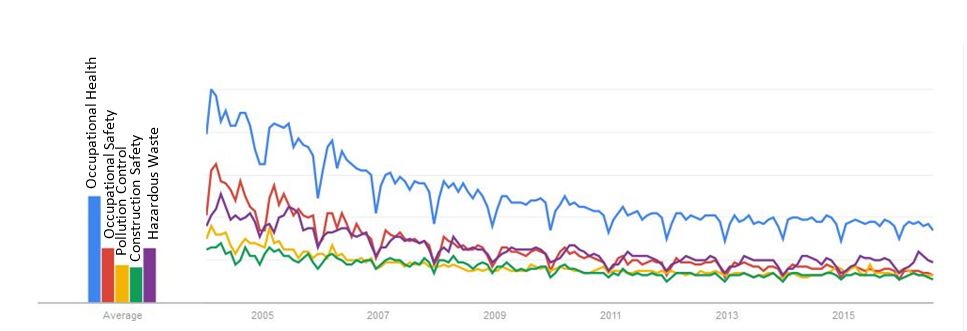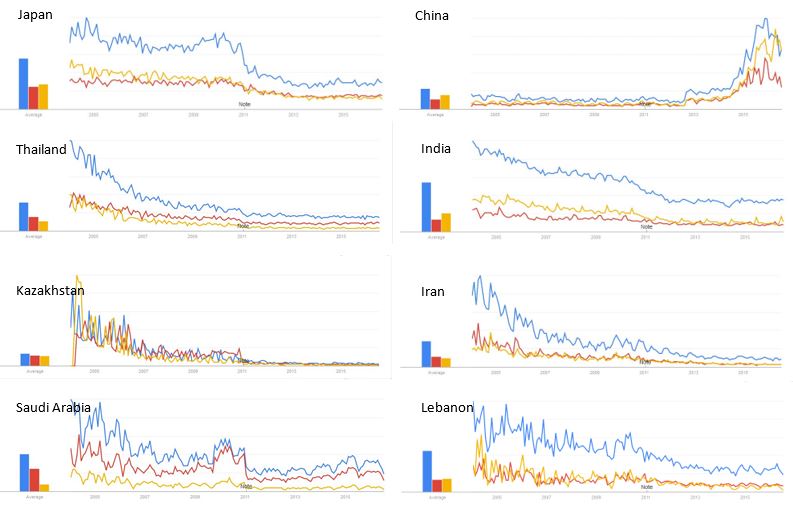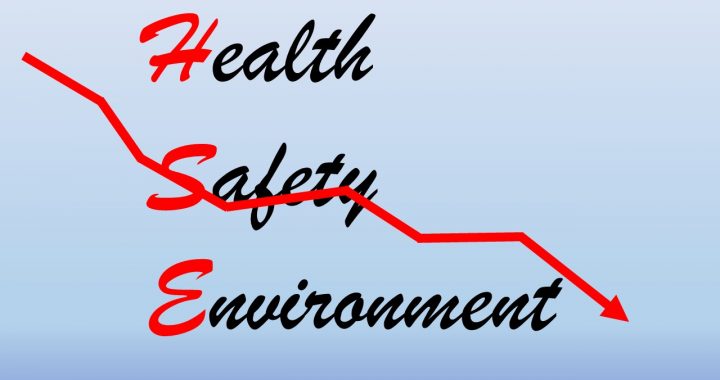I’ve been associated with the environmental consulting sector since the 1980s and more generally with HSE consulting and management for the last twenty years. Over the last couple of decades, I have noticed a steady, albeit subtle, decline in awareness and interest from both the corporate and public perspective in environmental issues (and I also believe this extends to many worker health and safety issues). As an example, when I first started to travel to Asia in the mid 1990s, environmental issues were front and centre in the daily newspapers. Today, these articles are more often than not buried in the back pages, if covered at all. Similarly, it seems to me that there is now less interest by clients in in implementing/improving corporate HSE management systems than there was 15-20 years ago, probably a reflection of tightening corporate budgets.
In this short blog post, I explore some simple data and published literature in an attempt to assess whether my perception is real or rather biased as a reflection of me getting older, grumpier and more pessimistic!
Google Trends’ Explore is a simple, albeit powerful tool that can be used as a starting point to investigate this issue. Google Explore allows one to assess time and geographical trends of keywords used in Google Search. For instance, enter keywords relevant to HSE into Explore (e.g., safety, health, environment, pollution, ISO14001, etc.) and out pops a wealth of information on geographic and temporal trends related to their use in Google Search.
The results were both fascinating and disappointing! There are clear trends in HSE-related keywords use over time. Unfortunately, these trends show a decline from 2004 to today in searches for the generic HSE keywords - health, safety and environment: This trend is consistent even when we drill down into more specific keywords, such as occupational health, occupational safety, pollution control, construction safety and hazardous waste:
This trend is consistent even when we drill down into more specific keywords, such as occupational health, occupational safety, pollution control, construction safety and hazardous waste: The same trends hold true for keywords such as ISO18001, ISO14001, safety plan, security plan and many other related keywords that I tested. Unfortunately, this does support my perception stated earlier that we are losing interest in HSE!
The same trends hold true for keywords such as ISO18001, ISO14001, safety plan, security plan and many other related keywords that I tested. Unfortunately, this does support my perception stated earlier that we are losing interest in HSE!
I am not the first one to identify this apparent decline in environmental interest. In fact, in 2013 Mccallum and Bury published a paper using Google search data from 2001 to 2009 and concluded that "Public interest in most aspects of the environment is sharply declining relative to other subjects". I could not find any comparable studies for occupational health and safety issues but expect that someone somewhere has done this also, probably with similar results.
But what about the biggest environmental issue we face today - global warming/climate change? Surely one would expect an increase in searches of related terms particularly in the last year or so as a result of the huge amount of publicity following the 2015 Paris Agreement and the many news reports of monthly temperature records, e.g., NOAA data indicating that May 2016 marked the 13th consecutive month a monthly global temperature record had been broken—the longest such streak since global temperature records began in 1880. Alas, instead of an upward trend,searches of related keywords sustainability, climate change, renewable energy and global warming have declined over the last decade after reaching a peak in 2007:
The results above are indicative of worldwide data. This means that they will be heavily skewed towards the main users of Google Search - US, Europe, etc. So, I also investigated if these same trends occurred in selected Asian countries, ones representing a broad range of socio-economic conditions across the continent - Japan, China, Thailand, India, Kazakhstan, Iran, Saudi Arabia and Lebanon. With one very obvious exception, the results are consistent with the global trends of declining search interest over time (note: blue- health; red - safety; yellow - environment):
 Most interestingly, the country that is most often maligned in the west for poor HSE performance, namely China, is the only one of these countries with an obvious increase in the use of these search terms over the last decade. These results also hold when we drill down into the more specific HSE keywords discussed above.
Most interestingly, the country that is most often maligned in the west for poor HSE performance, namely China, is the only one of these countries with an obvious increase in the use of these search terms over the last decade. These results also hold when we drill down into the more specific HSE keywords discussed above.
Is this observed trend in these China data genuine, truly representing an increase in HSE awareness over time, or is this some sort of data artifact - after all Google in not widely used in China? Based on other published studies, it does appears that these trends are real and not artifacts. For instance, there are published reports by academics using other types of data that have come to similar conclusions of increased environmental awareness in China over the last decade, e.g., Yan et al's 2012 study of trends in public environmental awareness in Shanghai and Guo and Marinova's 2011 study using data from across China. I could not find comparable academic studies for worker health or safety awareness in China, but I would not be surprised if the observed increasing awareness of these issues is also real.
Why is China an exception to the waning interest in HSE issues? That is a great question. I have no firm answer but expect it is a combination of social, economic and regulatory factors. I would definitely be interested in hearing from my colleagues in China for your thoughts on these trends. Regardless of the cause and given the size and growth of the Chinese economy, the fact that HSE awareness appears to be growing in China is certainly a positive take-home message from this blog post.
Now, if we can only get the rest of the world to follow the lead of the Chinese people!
Thanks for reading. Keep safe. Be healthy. Respect your environment.
I hope that you will bookmark the blog, share it with your colleagues and visit the blog frequently because you find it informative and helpful. I value your feedback and suggestions for future topics.
Please enter your email in the box at the top of the post and subscribe to our blog HSE Asia - our weekly blog will be emailed directly to you.
Next Week’s Blog Topic: Take a Break and Cool Down!
Photo Credits: HSE decline image courtesy of Redlog Environmental Ltd.
- Is Your Business Compliant with HSE Regulations? Take Our Quiz to Find Out! - September 16, 2024
- Duty of Care: What it Is and What it Means to Companies Operating in the GCC? - January 28, 2024
- Free E-Book:Health, Safety, and Environment Regulatory Review – United Arab Emirates: An Overview of Federal Requirements - July 5, 2023

Interesting post Randall, though not one I am hugely surprised by. Economic downturns always result in a reduction in HSE budget and focus. Safety not being compromised by cost and schedule is a lofty goal. I have never seen it in practice and in my recent experience it is only getting worse.
The concept of ‘lean management’ is itself becoming a risk in HSE matters, how to do more with less now resulting in many HSE managers having to take on the additional role of security management, something for which they have no training or competence. I’m sure security related internet searches will show an inverse of what the HSE related searches show – so competing pressures on the same budget, a case of whoever makes the most noise gets the lions share of the budget.
As professionals I think we hold some of the responsibilty for this. We do not generally prepare sufficient cost benefit analysis for safety programs nor do we utilise the Insurance industry sufficiently to obtain data regarding costs of HSE related insurance claims, costs of HSE related insurance premiums, how a well run program can help in reducing premiums and so on, particularly considering insurance is a key driver in an organisations compliance, often more so than regulatory compliance and penalties.
Being a UK citizen our HSE legislation is now primarily driven by the EU. With the recent propaganda regarding Brexit, from both sides of the argument, I suspect that near future environmental developments will be viewed with a degree of scepticism if not a complete lack of interest altogether. However with respect to the Asian markets, where I too predominantly work these days, COP21 and the Intended Nationally Determined Contributions put forward by the various countries also highlights some interesting differences. The most considered responses and the most challenging targets have been put forward by China, India and Bangladesh so I would expect an increased interest from those countries. As you say these countries are much maligned for their HSE performance however, from my somewhat limited experience of these countries, it appears there is a genuine willingness to learn and improve; which is not as evident amongst some of the other Middle East or East Asian countries. Interestingly Chinese contractors are becoming increasingly dominant players in the global construction market, something which has been attributed to their low cost product. If they can increase the quality of their product from a HSE perspective then they will hold this position for some time, at the expense of many of the local or more established contractors.
Neil, Thanks for the thoughtful comments. You raise many great points.
Surprisingly, and in contrast to what I would have thought, searches for “security” showed a similar downturn. So not sure what is driving that downward trend in HSE interest? I do not think it can be explained by economy as the trend has been consistent for well over a decade.
The issue of HSE managers taking on additional roles such as security is one that is near and dear to my heart and I have written about it in a previous blog post – H&S, OHS, HSE, HSSE, HSSEQ, HSSEQ/CSR … Alphabet Soupization
Great insight into the situation in China, India and Bangladesh and contrast to the Middle East. Could not agree more. It is always easy for the west to point fingers at China and India, but once in a while it is also worthwhile to sit back and applaud the progress on these key issues.